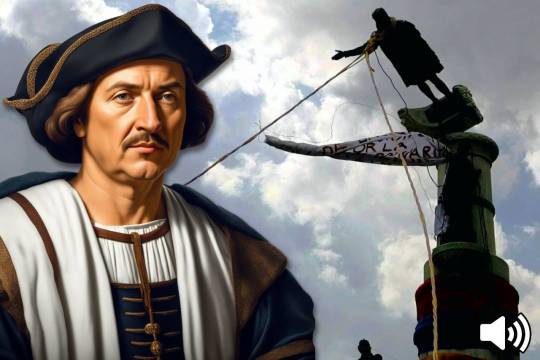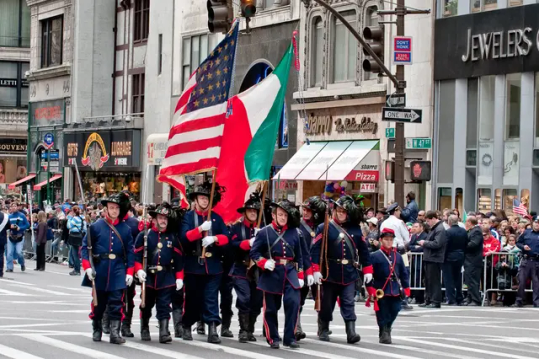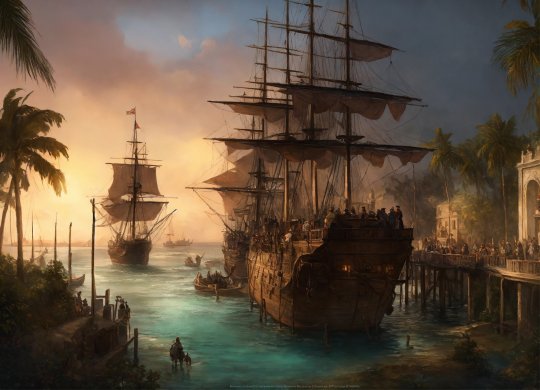#ColumbusDay
Explore tagged Tumblr posts
Text

boston, massachusetts october 1971
"wake up america" columbus day parade, north end
photograph by nick dewolf https://www.flickr.com/photos/dboo/10969222953
#photography#film#blackandwhite#bw#35mm#boston#massachusetts#northend#streetphotography#parade#columbusday#people#children#banner#wakeupamerica#thumbsupforamerica#1970s
84 notes
·
View notes
Text

"Christopher Columbus, during his voyages in the late 15th century, never actually set foot on what is now considered the mainland of North America. He did not “discover America” and he never met or came across an Native American Indian…"
ORIGINAL CONTENT: https://www.undergroundusa.com/p/time-to-set-the-record-straight-on
READ, SUBSCRIBE, SHARE & EDUCATE: PROTECT FREE SPEECH
#Columbus#ChristopherColumbus#ColumbusDay#NewWorld#Exploration#AtlanticOcean#Caribbean#America#History#Government#Biden#Harris#Marxism#Election2024#Election#Disinformation#Media#MAGA#GOP#Podcast#Constitution#USA#Woke#Democrats#Politics#News#Truth
3 notes
·
View notes
Quote
The Doctrine of Discovery furnished the foundational lie that America was “discovered” and enshrined the noble innocence of “pioneers” in the story we white Christian Americans have told about ourselves. It animated the religious and cultural worldview that delivered Europeans to these shores far before 1776 or 1619. Ideas such as Manifest Destiny, America as a city on a hill, or America as a new Zion all sprouted from the seed that was planted in 1493. This sense of divine entitlement, of European Christian chosenness, has shaped the worldview of most white Americans and thereby influenced key events, policies, and laws throughout American history….
Reconsidering Columbus Day with the Help of James Baldwin
6 notes
·
View notes
Text

Happy #ColobusDay! Lets celebrate the Colobus Monkey all day long! Today only, screenshot us a donation of $10 or more to the African Wildlife fund and receive a sketch!
Simply donate at least $10 to awf.org or MarketPlace | Direct Pay Online
and send us a screenshot (dm us on tumblr) and tell us what you want to draw. It's that easy!

4 notes
·
View notes
Text
Columbus Day: Origins, Controversy, and Modern-Day Observances

Columbus Day, celebrated on the second Monday of October in the United States, commemorates the arrival of Christopher Columbus to the Americas on October 12, 1492. While the day was originally intended to honor Columbus’ journey and the subsequent European exploration of the Americas, it has become a focal point of controversy and debate, particularly concerning the legacy of colonialism and its impact on Indigenous peoples. Over the years, the meaning and observance of Columbus Day have evolved, with some communities shifting to celebrate Indigenous Peoples’ Day instead.
Historical Background: The Voyage of 1492
Christopher Columbus, an Italian explorer sponsored by the Spanish monarchs Ferdinand and Isabella, set sail from Spain in 1492 with the goal of finding a westward route to Asia. Instead of reaching Asia, Columbus landed in the Caribbean, arriving on an island he named San Salvador, now believed to be part of the Bahamas. His arrival marked the beginning of sustained European exploration and colonization of the Americas. Though Columbus never reached the mainland of North America during his voyages, his expeditions had a profound effect on global history. His arrival paved the way for future exploration, settlement, and the exchange of goods, ideas, and culture between Europe and the Americas—an event often referred to as the Columbian Exchange. However, it also initiated centuries of colonization, exploitation, and violence against Indigenous populations, leading to significant loss of life and culture.
Origins of Columbus Day
The idea of honoring Columbus with a special day dates back to the late 19th century. Italian-American communities, seeking recognition and a sense of pride in their heritage, began to organize celebrations in honor of Columbus, who was seen as a symbol of Italian excellence and exploration. The first recorded celebration of Columbus Day took place in 1792 in New York City, marking the 300th anniversary of his landing. In 1892, in celebration of the 400th anniversary of Columbus’ voyage, President Benjamin Harrison encouraged Americans to celebrate Columbus Day. He described it as a patriotic celebration of progress and discovery, aiming to unite the country during a period of tension and division following the Civil War. The growing influence of Italian-American immigrants in the early 20th century helped Columbus Day gain recognition at both state and federal levels. In 1934, under pressure from the Knights of Columbus, a Catholic fraternal organization, President Franklin D. Roosevelt officially made Columbus Day a national holiday.
The Modern Celebration of Columbus Day
Today, Columbus Day is a federal holiday in the United States, observed on the second Monday of October. It is celebrated with various parades, cultural events, and educational programs, particularly in cities with large Italian-American populations such as New York, San Francisco, and Chicago. For many Italian-Americans, Columbus Day is an important symbol of cultural pride and a celebration of their contributions to American society. Schools and institutions often hold activities related to Columbus' exploration, teaching children about the history of his voyage and the European discovery of the New World. Traditionally, the holiday has been seen as a moment to celebrate the spirit of adventure, exploration, and the opening of new frontiers. However, the modern understanding of Columbus Day is far from universally accepted. As awareness grows about the negative impact of European colonization on Indigenous peoples, many Americans have begun to question the appropriateness of celebrating Columbus, whose arrival led to the destruction of Native American cultures, land, and lives.
The Controversy Surrounding Columbus Day
In recent decades, Columbus Day has come under intense scrutiny due to its association with the colonization of the Americas and the subsequent mistreatment of Indigenous populations. Critics argue that celebrating Columbus overlooks the devastating consequences his voyages had on Indigenous people, including the introduction of diseases, enslavement, and violence. Columbus’ role in initiating the transatlantic slave trade is also cited as a reason to reconsider the celebration of his legacy. Indigenous communities and their supporters view Columbus Day as a glorification of colonialism, arguing that the day erases the history and suffering of Native Americans. They assert that instead of honoring Columbus, the focus should shift toward recognizing and celebrating the resilience, cultures, and contributions of Indigenous peoples.
Indigenous Peoples’ Day: A Growing Movement
In response to the controversy, many states, cities, and institutions have replaced or supplemented Columbus Day with Indigenous Peoples’ Day. This day is intended to honor the history, culture, and contributions of Native Americans and to raise awareness about the historical and ongoing injustices they have faced. The first Indigenous Peoples’ Day was celebrated in 1992, during the 500th anniversary of Columbus’ voyage, in Berkeley, California. The movement to replace Columbus Day with Indigenous Peoples’ Day has gained significant momentum in recent years. As of 2024, over 20 U.S. states, along with numerous cities and universities, have officially adopted Indigenous Peoples’ Day in place of Columbus Day. This shift reflects a broader effort to acknowledge the complexities of American history and to give voice to those who have historically been marginalized. Proponents of Indigenous Peoples’ Day argue that it provides an opportunity for Americans to reflect on the nation’s colonial past, while also celebrating the cultures and contributions of Native peoples, both historically and in contemporary society. Events on Indigenous Peoples’ Day often include educational programs, cultural performances, and community gatherings focused on Indigenous history and heritage.
Current State of Columbus Day
Despite the growing movement toward Indigenous Peoples’ Day, Columbus Day remains a federal holiday, and it continues to be celebrated in many parts of the United States, particularly in Italian-American communities. For some, the holiday still symbolizes the spirit of exploration and the European contribution to the formation of the modern Americas. For others, however, it is a painful reminder of colonization and its ongoing impact on Native peoples. In some areas, Columbus Day parades have become a point of contention, with protests and counter-celebrations held by Indigenous rights groups and their allies. These groups use the day to highlight the ongoing issues faced by Native Americans, including land rights, systemic inequality, and the need for reparative justice. Conclusion: A Complex Legacy Columbus Day represents one of the most complex holidays in the American calendar. While originally intended to honor a historical figure and the spirit of exploration, it has become a battleground for debates about colonialism, identity, and historical memory. As the United States continues to grapple with its past, the ways in which it chooses to remember figures like Christopher Columbus may continue to evolve. Whether through the continued celebration of Columbus Day or the increasing adoption of Indigenous Peoples’ Day, the dialogue around this holiday forces Americans to confront the dual narratives of exploration and conquest that have shaped the nation. Ultimately, the ongoing discussion serves as an important reminder of the need to recognize both the accomplishments and the atrocities of history in order to foster a more inclusive and equitable future. Read the full article
0 notes
Text
Embracing The Culinary Delights Of My Ancestry Story
This is my first year of truly celebrating since I found out my true biological dna revelation. My newly discovered Native American heritage inspired me to make a Cherokee meal. I found this recipe on the web and it is delicious! So delicious it may be a new yearly treasure. This may very well be a new tradition as it was unique and truly full of flavor. Oklahoma Frybread Tacos! They, are soooo…

View On WordPress
#AncestryDNAStories#Arizona Celebrate#ColumbusDay#IndigenousPeoplesDay#NativeAmerican#celebrations#family#Homemaker#Phoenix
0 notes
Video
youtube
Flip Wilson on The Dean Martin Show - Christopher Columbus
0 notes
Text
Happy
Today, we celebrate the spirit of adventure and discovery. Whether you’re exploring new places or just dreaming of your next journey, let’s honor the adventurous spirit of Christopher Columbus.
Take some time today to learn more about this famous explorer who stumbled upon the land we call home.
https://www.history.com/topics/exploration/christopher-columbus

0 notes
Text

*THIS* Nina ⛵️(I can’t speak for Pinta nor Santa María 😉) would like to wish everyone a Happy Indigenous Peoples’ Day 🙏🏻🛶🏜🏕✌🏻 🚫Columbus Day🚫
0 notes
Text

boston, massachusetts 1971
protest sign columbus day parade
photograph by nick dewolf https://www.flickr.com/photos/dboo/419122474
#photography#film#color#35mm#streetphotography#boston#massachusetts#northend#parade#columbusday#people#woman#protest#protester#demonstrator#protestsign#ireland#britain#oppression#1970s
49 notes
·
View notes
Text

🎉 BSLBATT Celebrates Columbus Day!
On this special day, we honor the spirit of exploration, innovation, and the pursuit of new horizons. Just as Columbus ventured into the unknown, BSLBATT is committed to pushing the boundaries of battery technology and delivering sustainable solutions for our customers.
As we reflect on this holiday, let’s celebrate the progress we’ve made in advancing clean energy and the impact we can have on our communities. Together, we can continue to lead the way towards a brighter, more sustainable future! 🌍⚡
Wishing everyone a wonderful Columbus Day filled with inspiration and exploration!
0 notes
Text
Columbus Day: History, Food, and Culinary Myths
youtube
Columbus Day is celebrated in the U.S. on the second week of October, commemorating Christopher Columbus's arrival in America on October 12, 1492. While the day is recognized as a symbol of the Age of Exploration, it also sparks controversy over the impact of colonization on indigenous populations. Beyond its historical significance, Columbus Day is associated with traditions and culinary celebrations that highlight the multicultural influence on American cuisine.
History of the Holiday
The first celebrations of Columbus Day began in New York in the late 18th century among the Italian diaspora, as Columbus was Italian. Later, in 1937, President Franklin Roosevelt made it a national holiday. Italians considered Columbus a symbol of cultural pride, which led to the rise of parades featuring patriotic symbols, alongside culinary traditions.
Food and Columbus Day
Since the holiday is especially close to Italian-Americans, the tables are often filled with dishes inspired by Italian cuisine. Classic dishes such as pasta, lasagna, pizza, and various seafood are popular. In some regions, festivals are held where you can taste traditional Italian delicacies and wines.
One of the best-known culinary symbols of the holiday is the "Italian flag on a plate"—a combination of tomatoes, mozzarella, and basil, symbolizing the colors of the Italian tricolor. This light and vibrant salad has become a popular element on many festive tables during Columbus Day.
Culinary Myths Linked to Columbus
Like many historical figures, Columbus is surrounded by myths, some even related to cuisine. Here are a few interesting culinary myths associated with Columbus and his era.
1. Columbus "discovered" spices for Europe
There's a belief that Columbus brought spices from America, significantly changing European cuisine. In reality, while Columbus was searching for a route to the spice-rich lands of India, true "American" spices, like chili peppers, only became known to Europeans after later expeditions. The actual spice route was discovered by the Portuguese, not Columbus.
2. Columbus introduced potatoes and tomatoes to Europe
It's often assumed that Columbus introduced Europe to foods like potatoes and tomatoes, but that's not entirely true. These products indeed originated from the Americas, but their widespread use in European cuisine began only decades after Columbus's voyages. However, Columbus did play a significant role in initiating the cultural and culinary exchange between the Old and New Worlds, known as the Columbian Exchange.
3. Pasta came to Italy because of Columbus
A popular myth suggests that pasta was brought to Italy from China thanks to Columbus's travels. However, pasta existed in Italy long before his expeditions. Italians had been making dishes with dough long before encounters with new cultures.
Modern Traditions
In today's U.S., Columbus Day is not only a celebration of a historical event but also an opportunity to enjoy various dishes emphasizing Italian influence on American cuisine. Many families cook their favorite Italian recipes or visit restaurants offering special holiday menus.
In addition, in cities with strong Italian communities, culinary fairs and festivals are held. At these events, you can sample delicacies such as cheesy pizzas, fresh pasta, and exquisite desserts like cannoli.
Conclusion
Columbus Day is a holiday that not only reminds us of the importance of historical discoveries but also of the multicultural impact on cuisine and traditions. Despite the myths and controversies surrounding Columbus, his day has become a symbol of the blending of cultures and culinary traditions, especially evident in the Italian dishes that grace festive tables.
0 notes
Text
Oggi è il giorno di Cristoforo Colombo, un giorno di festa e di riflessione.
Colombo è stato un uomo coraggioso e determinato, che ha cambiato per sempre il corso della storia. La sua scoperta dell'America ha aperto un nuovo mondo di possibilità, ma ha anche portato a grandi sofferenze per gli indigeni che vivevano già in questo continente.
Oggi, è importante ricordare la storia di Colombo in tutta la sua complessità. Dobbiamo celebrare il suo coraggio e la sua determinazione, ma dobbiamo anche riflettere sui danni che ha causato.
#ColumbusDay #IndigenousPeoplesDay #HistoryRemix #TruthTelling #Decolonize
#ChristopherColumbusDay #ItalianHeritage #Exploration #Discovery #NewWorld

#ColumbusDay#IndigenousPeoplesDay#HistoryRemix#TruthTelling#Decolonize#ChristopherColumbusDay#ItalianHeritage#Exploration#Discovery#NewWorld
0 notes
Video
youtube
Outubro é o mês em que lembramos da "descoberta" da América por Colombo. Que tal aprendermos um pouco sobre os povos que foram dizimados com essa "descoberta"? Neste vídeo apresento o que sabemos sobre as incríveis línguas que eram faladas nas Antilhas em 1492 e que desapareceram em menos de um século depois da chegada dos Europeus.
#youtube#antilhas#Antilles#Colombo#ColumbusDay#Taíno#Taino#arawakan#indigenous languages#caribe#línguas indígenas#Caribbean#Columbus day#colonização#arawak#warao
0 notes
Text
#ColumbusDay#Ratech#RatechEngineering#DiversityAndInclusion#Engineering#Exploration#Discovery#NewHorizons#SailOn#History#Unity#Understanding#Compassion#Heritage#Celebrate#CulturalDiscovery#America#UnitedStates#steeldetailing#structuralsteel#tekla#sds2#steelindustry#teklasteeldetailingservices#building#civil engineering#design
0 notes
